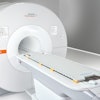Tuesday, December 1 | 10:50 a.m. -11:00 a.m. | SSG13-03 | Room N227
Researchers from Sweden have obtained promising results in their validation of an MRI software program designed to decrease scan time and improve quantitative measurements.The software, called SyMRI, is the brainchild of medical imaging software developer SyntheticMR of Linköping, Sweden. In this study, the researchers used the software on a 3-tesla scanner (Siemens Healthcare) and compared its diagnostic accuracy with that of conventional MR imaging for patients with multiple sclerosis.
In October 2014, 20 multiple sclerosis patients were scanned along with 20 healthy control subjects for both conventional and synthetic T1-weighted, T2-weighted, and fluid-attenuated inversion recovery (FLAIR) images.
The synthetic MR images were of "good to sufficient quality," with the exception of the FLAIR images, which were adversely affected by artifacts. SyMRI also correctly classified participants as either multiple sclerosis patients or normal subjects, according to the researchers.
"Synthetic MRI may reduce the scan time in multiple sclerosis patients while additionally delivering the ability to obtain any desired weighted contrast post-hoc, thus possibly increasing the sensitivity for pathological changes in the brain," said study presenter Dr. Tobias Granberg, researcher at Karolinska Institute and Karolinska University Hospital in Stockholm.
SyMRI "can provide robust volumetric brain measurements that can be obtained in tens of seconds without the need for manual intervention within PACS, thereby lowering the threshold for implementing these quantitative biomarkers into clinical practice," he added.




















